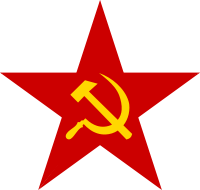Classless society
| Part of a series on |
| Communism |
|---|
 |
|
Concepts
|
|
Internationals |
|
Related topics |
|
|
Classless society refers to a society in which no one is born into a social class. Such distinctions of wealth, income, education, culture, or social network might arise and would only be determined by individual experience and achievement in such a society.
Codere defines social class as a segment of the community, the members of which show a common social position in a hierarchical ranking.{1} Codere suggest that a true class-organized society is one in which the hierarchy of prestige and status is divisible into groups each with its own social, economic, attitudinal and cultural characteristics and each having differential degrees of power in community decision{1}. However class organised societies rarely follow this structure, suggesting that a classless society might be better.
Since these distinctions are difficult to avoid, advocates, such as anarchists, communists, etc. of a classless society propose various means to achieve and maintain it and attach varying degrees of importance to it as an end in their overall programs/philosophy.
Classlessness
The term classlessness has been used to describe different social phenomena.
In societies where classes have been abolished it is usually the result of a voluntary decision by the membership to form such a society, to abolish a pre-existing class structure in an existing society or to form a new one without any. This would include communes, of the modern period, such as various Utopian communities, the kibbutzim, etc. as well as revolutionary and political acts at the nation-state level such as the Paris Commune, Russian Revolution, etc. The abolition of social classes and the establishment of a classless society is the primary goal of communism, libertarian socialism and anarchism.
Classlessness also refers to the state of mind required in order to operate effectively as a social anthropologist. Anthropological training includes making assessments of and therefore becoming aware of one's own class assumptions, so that these can be set aside from conclusions reached about other societies. This may be compared to ethnocentric biases or the "neutral axiology" required by Max Weber. Otherwise conclusions reached about studied societies will likely be coloured by the anthropologist's own class values.
Classlessness can also refer to a society that has acquired pervasive and substantial social justice; where the economic upper class wields no special political power and poverty as experienced historically is virtually nonexistent as it can't be achieved.
According to Beck, classlessness is achieved with class struggle,"It is the collective success with class struggle which institutionalizes individualization and dissolves the culture of classes, even under conditions of radicalizing inequalities."{2} Essentially classlessness will exist when the inequalities and injustice out ranks societies idea of the need for social ranking and hierarchy.
Social classes in present day
The state of social classes in society today is debated. If the actual development is taken by the discussion, then western society has moved passed classes to a classless society. This is reinforced by the statement from Becker and Hadjar, "The weakening of class identities is also postulated by Savage (2000, p.37), who assumes that although individuals may still refer to social class, class position no longer generates a deep sense of identity and belonging."{3} However, society today has not completely abolished classes because distinctions not attributed to experience and success still exist.
Marxist definition
In Marxist theory, tribal hunter-gatherer society, primitive communism, was classless. Everyone was equal in a basic sense as a member of the tribe and the different functional assignments of the primitive mode of production, howsoever rigid and stratified they might be, did not and could not, simply because of the numbers, produce a class society as such. With the transition to agriculture, the possibility to make a surplus product, i.e. to produce more than what is necessary to satisfy one's immediate needs, developed in the course of development of the productive forces. According to Marxism, this also made it possible for a class society to develop, because the surplus product could be used to nourish a ruling class, which did not participate in production.
Social libertarianism
Social libertarianism - also called social anarchism, left-libertarianism, and socialist libertarianism - is a group of anti-authoritarian political philosophies that rejects socialism as the centralised state ownership and control of the economy. Political philosophy is the study of fundamental questions about the government, state, justice, politics, liberty and the enforcement of a legal code by an authoritative body. According to Larmore, the second approach sees political philosophy as the freedom to discipline one-self from the basic features of the human condition that make up the reality of political life.{6}
Libertarianism includes various political philosophies including social libertarianism. The philosophies each share the common overall goal of minimal government. Priortizing freedom of speech, freedom of assembly, freedom to bear arms, freedom of and from religion, freedom of the press, freedom of ownership and economic freedom. It promotes personal responsibility and privatisation as opposed to the provision of services by the state, rejecting the compulsions of communism and socialism. {7}
Movements described as libertarian socialists include anarchism (especially anarchist communism, anarchist collectivism, anarcho-syndicalism,[27] and mutualism[28]) as well as autonomism, communalism, participism, guild socialism,[29] revolutionary syndicalism, and libertarian Marxist[30]philosophies such as council communism[31] and Luxemburgism;[32] as well as some versions of "utopian socialism"[33]and individualist anarchism.[34][35][36][37]{8}
See also
References
- Codere, H.. (1957). Kwakiutl Society: Rank without Class. American Anthropologist, 59(3), 473–486. JSTOR 665913
- Beck, U. (2007). Beyond class and nation: Reframing social inequalities in a globalizing world. The British Journal of Sociology, 58(4), 679-705. doi:10.1111/j.1468-4446.2007.00171.x
- Becker, R. and Hadjar, A. (2013), “Individualisation” and class structure: how individual lives are still affected by social inequalities. International Social Science Journal, 64: 211–223. doi:10.1111/issj.12044
- Anarchism. (2015). In The Hutchinson unabridged encyclopedia with atlas and weather guide. Abington, United Kingdom: Helicon.
- Beitzinger, A. J., & Bromberg, H. (2013). Anarchism. In R. L. Fastiggi (Ed.), New Catholic Encyclopedia Supplement 2012-2013 (Vol. 1, pp. 70–72). Detroit: Gale
- Larmore, C. (2013). What is political philosophy? Journal of Moral Philosophy, 10(3), 276-306. doi:10.1163/174552412X628896
- Libertarianism - By Branch / Doctrine - The Basics of Philosophy. (n.d.). Retrieved May 8, 2016, from http://www.philosophybasics.com/branch_libertarianism.html
- Libertarian socialism
